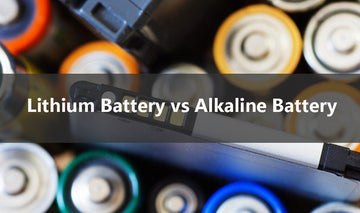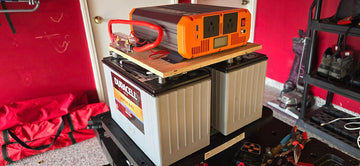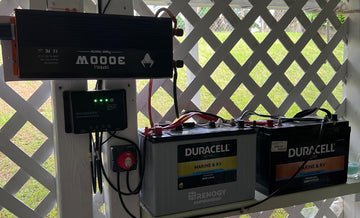In today's world, we rely on electronic devices that require reliable power. The two dominant players in the battery market are lithium and alkaline batteries. Lithium batteries offer high energy density and long life and are commonly used in portable electronics, electric vehicles, and renewable energy storage. Alkaline batteries, on the other hand, are affordable and versatile, making them a must-have for everyday devices. But what's the difference between lithium and alkaline batteries? And which is better? We'll help you choose the right battery for your device.
What is the lithium-ion battery?

Lithium-ion batteries are a major innovation in energy storage, using complex chemistry to power devices. These batteries are made up of multiple layers that work together to achieve superior performance and reliability through a delicate balance of technologies. The basic structure of a Li-ion battery consists of three main parts: cathode, anode and electrolyte. The principle of operation is that lithium ions move between the anode and cathode through the electrolyte.
- Cathode: Usually made of lithium metal oxides. Common cathode materials include lithium cobaltate (LiCoO2), lithium iron phosphate (LiFePO4) and lithium manganate (LiMn2O4).
- Anode: usually made of graphite or other carbon-based materials.
- Electrolyte: The electrolyte is the medium through which lithium ions move between the cathode and anode. The electrolyte is usually a lithium salt dissolved in an organic solvent. The most commonly used electrolyte is a mixture of lithium hexafluorophosphate (LiPF6) and an organic solvent.
When the battery is charged, lithium ions are extracted from the cathode, moved through the electrolyte to the anode, and stored as lithium compounds. When the battery is discharged, the process is reversed, with lithium ions moving from the anode through the electrolyte to the cathode, creating a flow of electrons that are used to power electronic devices.
Lithium-ion Battery Applications
Lithium-ion batteries are widely used in various applications, including consumer electronics (smartphones, laptops, tablets), electric vehicles, portable power tools, renewable energy storage systems, and more. They have become the preferred choice due to their high energy density, lightweight design and rechargeable nature, providing a reliable and efficient power source for numerous devices and applications.
lithium-ion battery for solar energy storage

This 12.8V 200AH LiFePO4 battery can then be used to store solar energy. The solar panel receives light and converts the solar energy into electricity, which is stored in the lithium-ion battery. When the stored energy is needed, the lithium-ion battery converts it into an electric current that is supplied to electrical devices.
Lithium-ion batteries were chosen to store solar energy because of the following advantages:
- High energy density: Lithium-ion batteries have a high energy density, which means they can store large amounts of energy in a relatively compact size. This is important for solar energy storage systems because it allows for efficient use of space and makes the system more cost effective.
- Efficiency: Li-ion batteries have high charge and discharge efficiencies, typically over 90%. This means less energy is lost during charging and discharging, resulting in more efficient energy storage and use.
- Long cycle life: Lithium-ion batteries have a long cycle life and can withstand a large number of charge and discharge cycles before losing significant capacity. This longevity is beneficial for solar storage systems, which typically require frequent charging and discharging.
- Scalability: Lithium-ion batteries are scalable, allowing solar energy storage systems to be easily expanded by adding more battery modules. This flexibility is valuable for adapting to changing energy demands and accommodating future growth.
- Fast charge and discharge: Lithium-ion batteries charge and discharge relatively quickly, allowing them to respond quickly to fluctuations in solar power generation and electricity demand. This capability makes lithium-ion batteries suitable for applications that require rapid energy delivery.
In summary, lithium-ion batteries provide an efficient, reliable and scalable energy storage solution for solar power systems. They help to maximize the use of solar energy, improve grid stability and facilitate the integration of renewable energy into the existing energy infrastructure.
What is the alkaline battery?

An alkaline battery is a disposable battery that uses an alkaline electrolyte, usually potassium hydroxide (KOH), to generate electrical energy through a chemical reaction. The following are the main components and operating principles of an alkaline battery:
- Cathode: The cathode of an alkaline battery is typically composed of manganese dioxide (MnO2), which serves as the positive electrode. It acts as the reduction site in the battery's chemical reaction.
- Anode: The anode is made of zinc powder and serves as the negative electrode. It acts as the oxidation site in the battery's chemical reaction.
- Electrolyte: The electrolyte in an alkaline battery is an alkaline solution, usually potassium hydroxide (KOH). It facilitates the movement of ions between the cathode and the anode during the battery's operation.
During discharge, the chemical reaction takes place between the cathode, the anode, and the electrolyte. The manganese dioxide at the cathode accepts electrons and reacts with zinc at the anode, forming zinc oxide and water. This reaction releases electrons that flow through an external circuit, generating electrical current to power devices.
Alkaline Battery Applications
Alkaline batteries are commonly used in a variety of low-drain devices such as flashlights, remote controls, toys, and radios. It batteries provide reliable, convenient power at a relatively low cost, making them popular for many applications.
In addition, alkaline batteries are not designed to support recharging and repeated use. As the chemical reaction within the battery produces electrical energy, the reactants are gradually consumed and cannot be recharged to restore their initial state. They are usually discarded after use.
While alkaline batteries are affordable, there are some drawbacks that should not be overlooked:
- Disposable: Cannot be recharged and reused. When batteries run out of energy, they are typically discarded, wasting resources and harming the environment.
- Low energy density: Alkaline batteries have a relatively low energy density compared to some rechargeable batteries. This means they store less energy for the same volume or weight and may need to be replaced or recharged more often.
- Self-discharge: If left unused for a long period of time, a battery may gradually lose energy during storage.
- Unsuitable for high power requirements: Alkaline batteries may not provide sufficient power in high drain devices. For high drain devices or devices that require a large amount of energy output (such as some digital cameras or high intensity flashlights), rechargeable batteries or other high performance battery technologies may be more suitable.
- Environmental impact: Because alkaline batteries are typically single-use and difficult to recycle, large quantities of discarded alkaline batteries can have a negative impact on the environment. Chemicals in batteries (such as alkaline fluids and metals) can contaminate soil and water sources.
- Cost over time: While alkaline batteries are initially affordable, they have a limited lifespan. Their disposable nature means that costs increase over time, especially for devices that require frequent battery replacement.
Comparison between lithium vs alkaline batteries
The following can be used as considerations when selecting a battery:
Energy Density: Lithium-ion batteries have a higher energy density than alkaline batteries. This means that lithium-ion batteries can store more energy in the same volume or weight, allowing them to last longer in high-power devices.
Voltage Output: Lithium-ion batteries typically have a higher nominal voltage, which provides a more stable voltage output throughout the discharge cycle than alkaline batteries. The advantage of lithium-ion batteries is especially apparent in high-drain situations.
Shelf life: Lithium-ion batteries have a longer shelf life than alkaline batteries. They remain charged longer when not in use. Alkaline batteries discharge more quickly, especially at higher temperatures.
Cost: Alkaline batteries are generally less expensive than lithium-ion batteries. Lithium-ion batteries are generally more expensive due to their advanced technology and high energy density. However, alkaline batteries require more frequent replacement.
Environmental impact: Lithium batteries are generally considered more environmentally friendly than alkaline batteries. This is because lithium batteries can be recharged and reused, reducing the number of batteries that end up in landfills. Alkaline batteries are disposable, less recyclable, and contribute to electronic waste.
Device suitability: Lithium batteries are generally suitable for high-drain devices such as digital cameras, smartphones and laptops that require long-lasting power and stable voltage. Alkaline batteries, on the other hand, are more suitable for low-power devices such as remote controls, watches and toys.
Which one do I choose?
Although lithium batteries outperform alkaline batteries, they are not necessarily the best choice for every application. In some cases, the benefits of lithium batteries are not obvious. Alkaline batteries are a better choice for low and medium drain devices. Below is a brief breakdown of some of the applications for which each battery is best suited:
More suitable for lithium batteries:
- drones, remote control airplanes
- Portable game consoles
- cordless drills, electric screwdrivers
- Networked programmable thermostats
- Keyless door locks
- Home security systems
- Digital cameras
- GPS devices, trackers
More suitable for alkaline batteries:
- Toys
- MP3 Players
- Small Speakers
- Flashlights
- Emergency lights
- Laser pointer
- Clocks
- Portable Lights
- Thermometer
- Remote controls
- Smoke detectors and fire alarms
FAQs
Q: Why do lithium batteries last longer?
A: This is because they have a higher energy density than alkaline batteries and maintain a more stable voltage output throughout their service life.
Q: Can I use lithium batteries in anything?
A: Li-ion batteries are not suitable for all situations, and the choice of battery still needs to take into account the needs of the particular device, safety, economy and environmental factors. For infrequent use or large-scale applications, a more affordable alkaline battery type may be more appropriate.
Q: Is there any danger to a lithium battery?
A: Lithium batteries may pose some safety risks in some situations, especially if not used or handled correctly. When using batteries it is recommended to follow the guidelines provided by the manufacturer.













